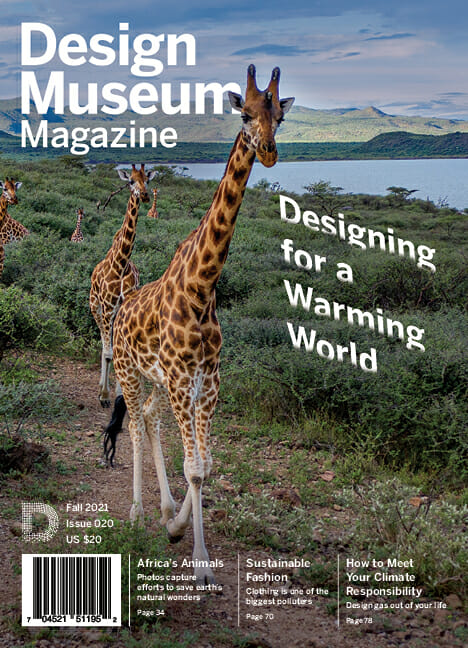Cultivating Health Equity through Afro-Indigenous Stewarded Farming
A Q&A with SUSU commUNITY Farm’s Collaborative Director, Amber Arnold
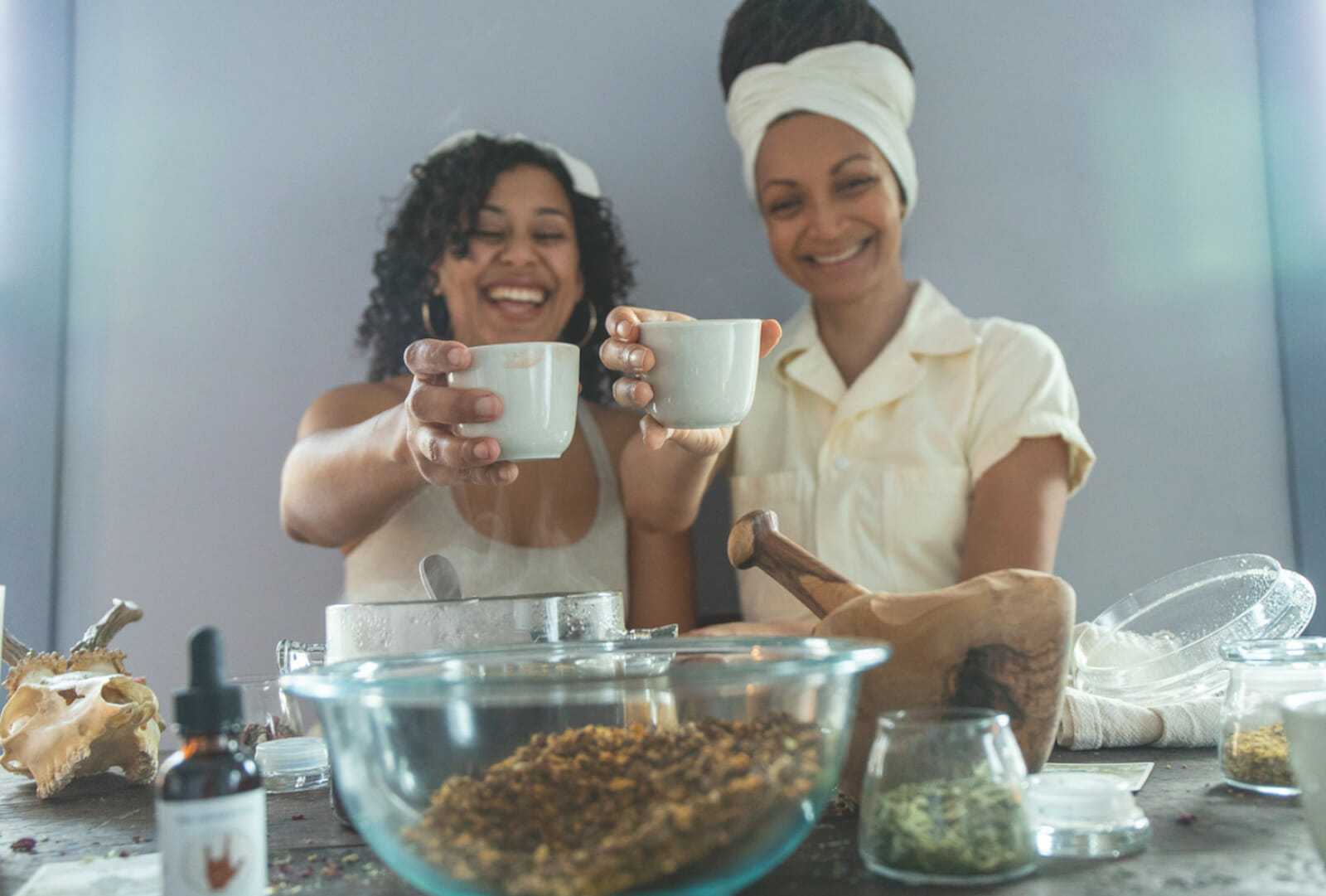
Photos courtesy of Susu Community Farm
Interviewed by Sara Magalio, Editorial Producer, CoDesign Collaborative
The SUSU commUNITY Farm is an Afro-Indigenous stewarded farm and land-based healing center in Southern Vermont that elevates Vermont’s land and foodways. The organization accomplishes this by co-creating a life-affirming and culturally relevant platform for Black, Indigenous, people of color, youth, and under-resourced individuals, and allies to thrive and experience safety and connection while beginning to develop the tools and agency to heal from the trauma of colonization.
SUSU aspires to co-create an equitable and just culture for the global majority to thrive in Vermont that focuses on access to safe and affirming food, community, and job opportunities, by offering culturally relevant spaces that center Earth-based and Afro-Indigenous health and healing traditions as well as reclaiming and centering the wisdom, stories, and legacies of past generations.
In the following interview, SUSU comUNITY Farm’s Amber Arnold, who serves many roles for the organization, including as its Co-Executive Director of Community Outreach and Community Food, shares with CoDesign Collaborative how this organization came into being, defied the odds to thrive through the COVID crisis, and will continue to positively impact its community in the future.
This conversation has been edited for length and clarity.
Sara Magalio: Amber, I would love to start by having you outline how you got started with SUSU and where the inspiration for creating this community came from.
Amber Arnold: My collaborative director Naomi Moody and I had actually started a different organization first—an LLC called the SUSU Healing Collective—and we really wanted to create a space in Brattleboro, VT for Black and brown people to access safety, belonging, connection, and a space to experience healing. We incorporated sound healings, yoga, and different African spiritual practices into the offerings of the organization. We also had a botanica with herbs that we grew and tinctures that we made in house. We had planned that, in the future, we would want to expand the collective and start this farm project, and so we opened that component of the community two weeks before COVID shut everything down. We were open for only a matter of days before we had to close, and it was really sad, because we had people come all the way from Washington, DC to kick off the opening, and it was just really fun and wonderful to see everyone come together to promote this common goal.
In the following weeks, as the pandemic raged on and the country reckoned with the murder of George Floyd, on top of having to worry about COVID and social upheaval, our community was also worrying about accessing food, because in the area that we live in, a significant portion of the community had the resources to hoard food—which was a phenomenon that occurred throughout the country. We also saw in Vermont that community supported agriculture, or CSAs, are quite popular, and those sold out very, very quickly. This is because a lot of lower income families applied for funding from the Northeast Organic Farming Association (NOFA) to get a stipend to be able to pay for their CSAs, but by the time that they were accepted for the funding, the CSAs were already purchased by people who could pay for them up front. Seeing this chain of events, we feel strongly that under-resourced communities should not have to worry about where they’re going to access nourishing food.
It is a well known fact that consuming healthy food benefits immunity, and we have seen in the events of these last months how crucial it is to maintain a strong immune system. On top of that, while police brutality and state sanctioned violence is a horrific reality that Black and brown people in this country grapple with each day, it is a disturbing truth that more people of color in the U.S. die from food related illness than any other type of state-sanctioned violence. (1) To combat this lack of access to nutritious food in our community, we decided that we were going to start a GoFundMe and raise money to purchase CSAs for Black and brown families in our area.
We wanted to raise enough to purchase 25 CSAs to start, and within three days, we had raised about $20,000, which was enough to purchase those CSAs and welcome 30 families into our community. On top of the money that we raised, there was a wonderful positive response from a lot of local businesses, who donated eggs, bread, more vegetables, and self-care products.
So with the success of our initial fundraising efforts, we began in earnest our first program for SUSU commUNITY Farm, centering on our belief that food is a birthright that should not be treated like a commodity, and that what the Earth gives to us abundantly should be something that everybody can access. As we expanded our programs, the money just kept coming in, and at that point we could not purchase any more CSAs, because all the farms were just sold out. So we decided to work toward another vision that we had, which is purchasing land to make food security a permanent part of this area. We were inspired by the words of Fannie Lou Hamer, (2) who said, “If you give a hungry man food, he will eat it. If you give him land, he will grow his own food.” We want to purchase this farm and set it up in a way that the farm would, in perpetuity, be accessed by people of color, so that it wasn’t owned by us, but it could always be in the hands of the community, as a safe place for people to go. We are currently in the process of purchasing the farm, and we should be on the land in October.
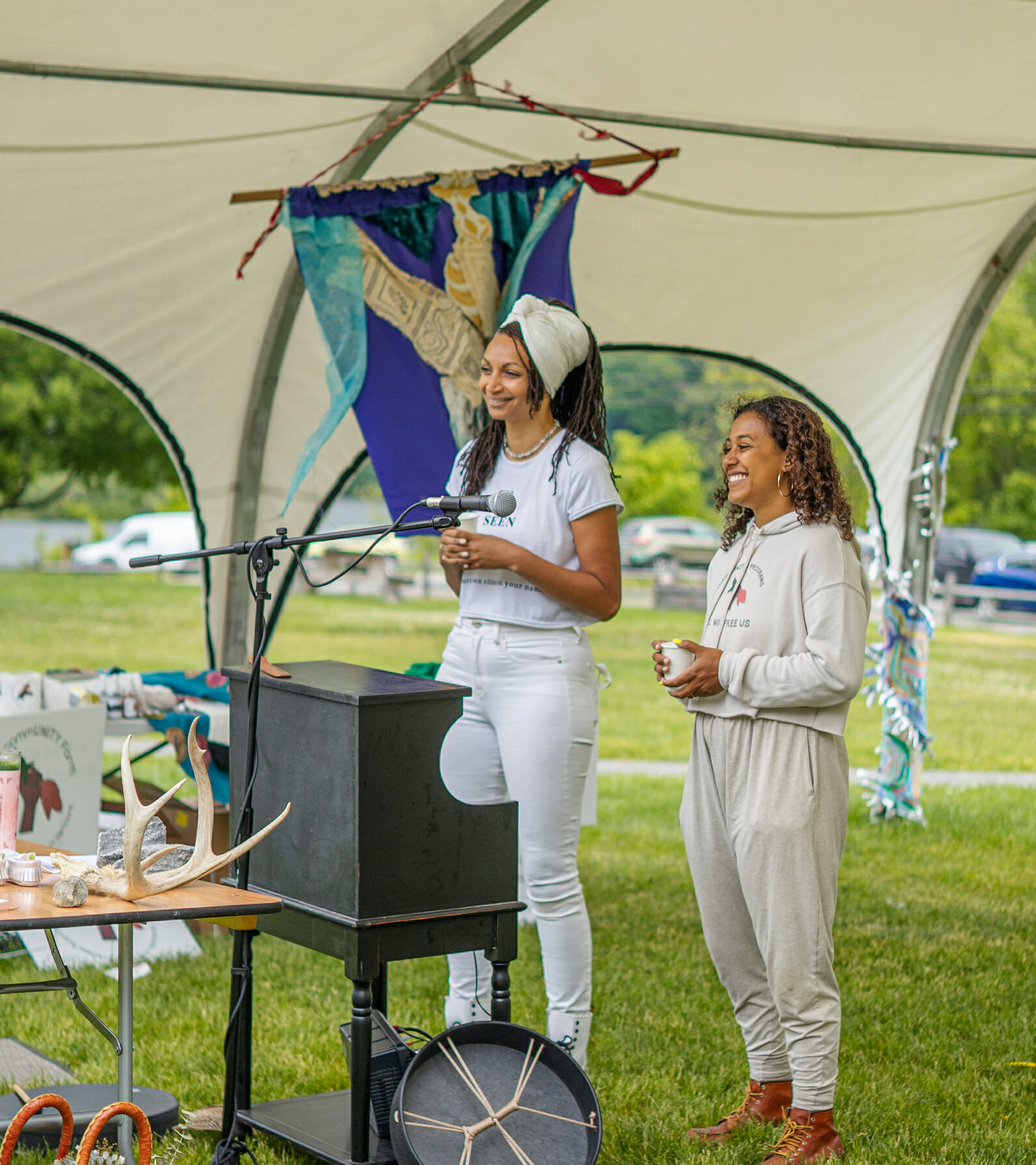
SM: It’s just incredible that you were able to create such an amazing organization in the first place, but to do so during a global pandemic is truly remarkable. Being that this magazine issue is centered on climate change and sustainability, can you share your thoughts on the interplay between racial inequities and climate change, and how that connects back to disparities in access to nutritious foods?
AA: I think climate change is really a direct result of white supremacy, and having people in positions of power whose relationship with the land is purely transactional—they see themselves as above the land and treat it in that way. So a lot of work that we do, especially with white folks, is around connecting back with the Earth. It’s much harder to exploit the Earth when you have a deep, personal relationship with the Earth, and you see it as a sovereign being instead of as this thing to claim ownership over.
As we designed the functionality of the CSAs, the concept of creating a sustainable process was paramount. Instead of focusing purely on deliverables, we strive to follow the mantra of, “How much does the Earth want to grow, and how do we work with the Earth in this process? How do we do things in a way that is aligned with the way that nature naturally works?” Where a lot of traditional farming involves going really against the way that nature works, costing tons of money and resources, we’ve really centered Afro-Indigenous growing practices—working with the land, saving seeds, and not taking in more than we need.
We’ve been looking into all the aspects of how to operate in a way that gives equally to the Earth. For example, with soil amendments, oftentimes people will purchase fertilizer and other expensive additives that use mining and really exploitive practices in order to create those products. The products are also filled with chemicals that are then going into the soil, which can have harmful long-lasting effects. We have been sharing easy ways to create natural fertilizers with our community to promote this sustainable practice. For instance, you can go to a local orchard and get all the rotten apples from the ground, and then fill a bucket with rainwater and those apples to make apple cider vinegar. Then, you can go to a local restaurant and take their compost scraps, extract them in the apple cider vinegar you made, and use that to feed your plants. This is actually much better for the soil too, because it involves using natural and locally sourced components.
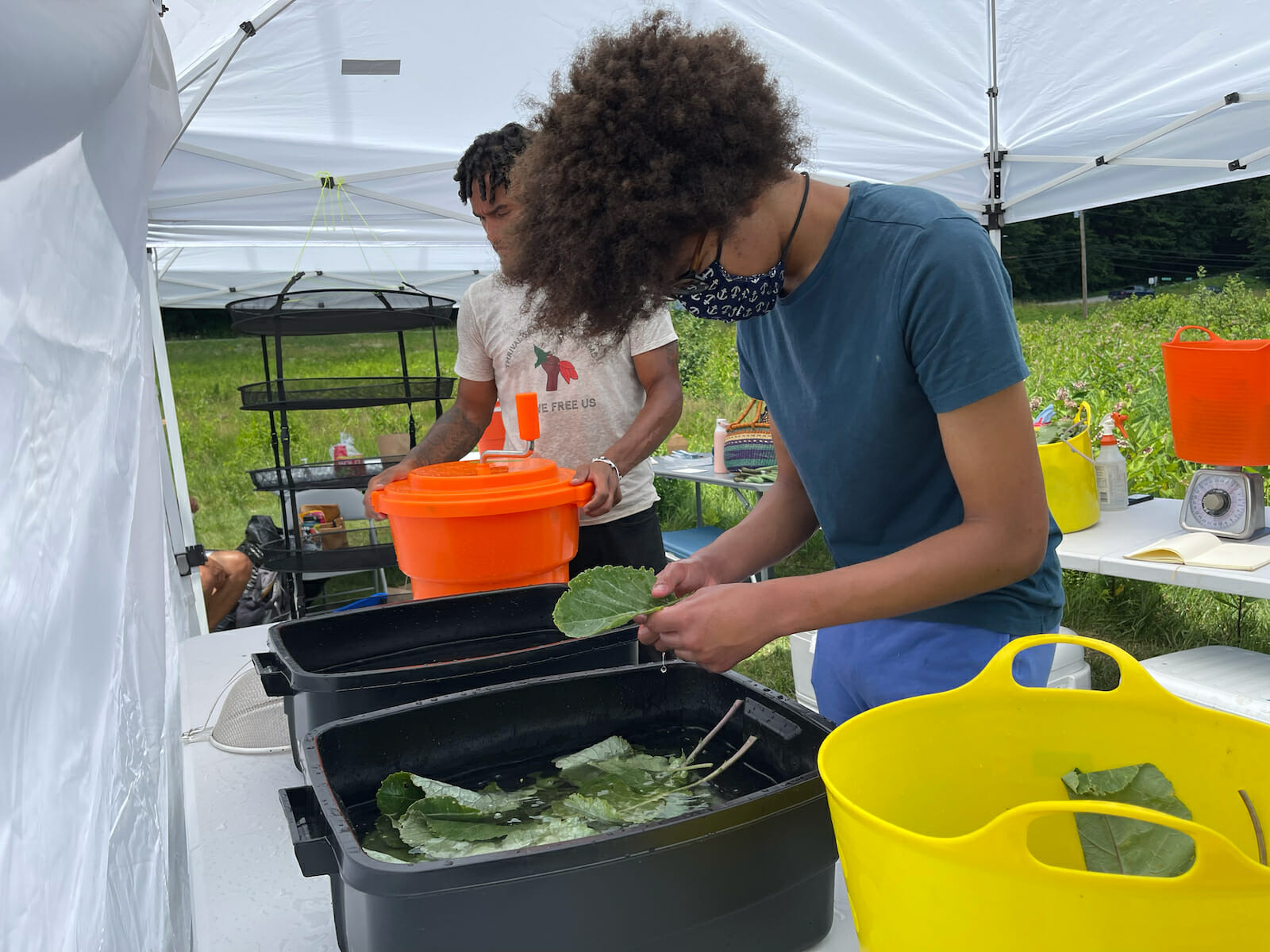
SM: It is so important to promote ways that we can adopt more sustainable practices in our everyday living, and it’s great that SUSU can use it’s platform to do so. I understand that in addition to the organization’s agricultural initiatives, SUSU also functions as a healing center. Could you delve into different ways that you provide these healing attributes, aside from what you’ve previously shared?
AA: Because we are still fundraising for our farm, we are currently focusing on developing different programs that are going to connect people back to the Earth and back to Earth-based practices within our lineages. One of those programs is the Storyteller Garden. Our plan is to build multiple gardens that feature the produce and agricultural practices of the people that are part of our community. These gardens will reflect all of the people who are a part of our programs, and it will connect people back with the traditional ways that their ancestors grew food, which they have been disconnected from through colonization.
We also are providing Food as Medicine classes that teach people how to use the vegetables and the foods that our community members grow for the CSA boxes, with the goal of bringing the magic and the ritual back into the way that we work with food. And this idea of ritual in food preparation can be seen in even the most seemingly menial of tasks. For instance, with washing our vegetables, instead of thinking of it as a laborious task, we turn it into a spiritual bath, including prayers, song, and herbs that we put into the wash. We have an herbalism program that centers on Afro-Indigenous practices around growing herbs and learning about their lineages, in terms of healing and using food as medicine. These products that are made from the classes will be sold along with the produce in our CSA boxes, allowing the larger community to experience the products and learn more about the unique cultures that they are derived from. And for 21 weeks, BIPOC families in Southern Vermont receive a free box of these organically grown, culturally relevant veggies, medicinal herbs, and other goods from local Vermont businesses.
We are also working on developing robust youth programming, which we are calling the Youth to Liberation pipeline. This initiative will connect youth in our community to Black and brown mentors, providing them with a stable, sustainable community. This will be a place for our youth to belong, to connect back with the Earth, and to move through the trauma that is held in our body, working with the land as a resource for healing.

SM: I am glad that you brought up the Youth to Liberation pipeline; I was particularly interested in this program as I was learning more about SUSU ahead of this conversation. I know sometimes it requires a specific, nuanced approach to reach out to younger people who may not be as interested in certain ideas. Can you share how SUSU plans to get younger people interested in farming, their ancestral agricultural practices, and their cultural lineages in general?
AA: We are thinking of the youth program as an alternative and a preventative program to the juvie system, mental health institutions, and other programs that we have in place right now in Vermont. Everything connects back to the land, and I think in our culture we often compartmentalize nature out of our everyday lives, because we may not frequently come into contact with it. We are working to center on what the youth care about and what is most important to them, while figuring out ways to merge their interests with the cultural ideals that we are sharing in our community.
For example, one of the programs that we’re planning to have on the farm is on-site barbering services for Black and brown folks. In our area, if you want to get a fade, or a haircut specifically tailored for your hair texture, you would have to drive to Springfield, which is 45 minutes away. This is a long ride for a haircut, especially when you’re a young person that doesn’t have a car. For all individuals, and especially younger people, having a haircut that you can feel confident in is so crucial to both self-perception and the way they are able to interact with their peers. So we have Black and Puerto Rican barbers in Springfield who are planning to come to the farm regularly and do free haircuts and free fades, and to teach the youth about hair and how to cut, style, and care for it.
In bringing the youth to the farm and having them be able to get their hair cut, engage in activities like dance battles, and socialize with their peers, they can connect with each other and the land in ways that make sense to them and gradually become more comfortable in this farm space. As they become more acclimated to this environment, this allows for opportunities to engage with farming or growing food, opening the doors of curiosity to this world of sustainable, mindful farming. A huge part of how we can resist systems of oppression is through the ways that we care for our bodies, and we can do that by growing food using the teachings of our ancestors, with all of the wisdom and the beauty that they had that was so connected to agriculture.

SM: Hearing about all of these programs, it is clear that this is so much more than a farm. You are creating a space where community members of all ages can truly thrive. I know that during the height of the pandemic, when the physical communal space could not be utilized, SUSU provided virtual programming that allowed the collective to continue to connect. Can you speak to the work that SUSU has done and continues to do virtually, and how that intermixes with the physical programs that typify the organization?
AA: The virtual programming was a tough one to adapt to. I feel virtual programming is not my favorite at all, and there’s a lot of cons to it, but there are also distinct benefits. At the present time, virtual programming has been essential because of COVID, and also because we don’t have that physical farm location yet, so once we’re on land and once it’s safer to do so, a lot of our programs are going to be transitioned into an in-person format. In the meantime, we have been developing a teachable website. It’s a platform that has online courses and talks that are pre recorded and materials that our community can access. The ultimate goal is to have both in-person courses and the programs that we’re doing right now virtually, so that we can bring as many people into the community as possible. We’ve had a lot of people take our virtual classes that are from all over the world, and we want to allow them to continue doing that. We definitely invite all people to participate in our programs, and that’s really beautiful, but our programs are also very much designed with the specific embodied experience and culture of Vermont, because Vermont is such a unique place. When we talk about organizing and racial justice, being in this very rural area is a big part of our identity, so we’ve really focused our programming to support people in growing in the specific environment that we live in.
SM: It is great that SUSU has found a way to retain a global audience while still catering to the experiences that are specific to the geographic area that its physical participants reside in. I know that you guys are very much still in an evolutionary phase, and you’re working through getting to your final goals of what you want SUSU commUNITY Farm to be. Five years into the future, or even beyond, where do you want to see the organization evolve to?
AA: That is a question that we have been reflecting on as an organization. We recently did a comprehensive review of our business plan, and I remember thinking, “Oh my gosh, we have so much in here that we’re planning to do. This is going to take such a long time.” But for the future of SUSU, I envision us having this space on land, doing these programs, really impacting change and transformation in the whole Vermont landscape and culture, and having secure systems to support the youth, people of color and, and white folks who are doing this work.
As I previously mentioned, we really think of our offerings as preventative and alternative programs. The goal is to create systems for people to go into to access safety and connection, to actually heal and grow without the policing system by being a part of a supportive community. I do see in the future us being able to hold more land and maybe even build housing for Black and brown people, creating these spaces for people where they really feel like they belong, are not over policed, and have their autonomy. As we increase our resources, we need to continue to hire staff that are invested in our organization and helping it grow. One thing that’s really important to us is hiring people that don’t necessarily have a college degree or extensive experience, but that have street knowledge and life experiences that can help them contribute to the community. You do not need any type of farming experience to join SUSU; we are all about empowerment through teaching new skills. In order to hire staff like that, though, we also have to increase our capacity of having some staff who know how to farm already, to mentor new people coming in.
I would also say that, for us, a goal that we will continue to promote is providing a product that naturally attracts people to our community. As we have delved into researching advertising strategies and promoting SUSU, we have seen that there is so much focus on, “How do we advertise so we can get people to come to Vermont or do these things?” For us, we believe that we don’t really need to advertise anything. We just need to create spaces that people enjoy being in and want to be in, and then they will come, instead of focusing on having to persuade people into coming to a space.
When I close my eyes and envision the future of SUSU, I picture this really long table with beautiful flowers, Afro-Indigenous food, candles and little fireflies. I see Black and brown kids running around and playing, and families sitting on the farm, laughing, dancing and just enjoying being here and having the space to really open up their bodies and minds and feel like, “I’m safe, I belong, and I get to breathe fresh air and be with the trees. I am home.”
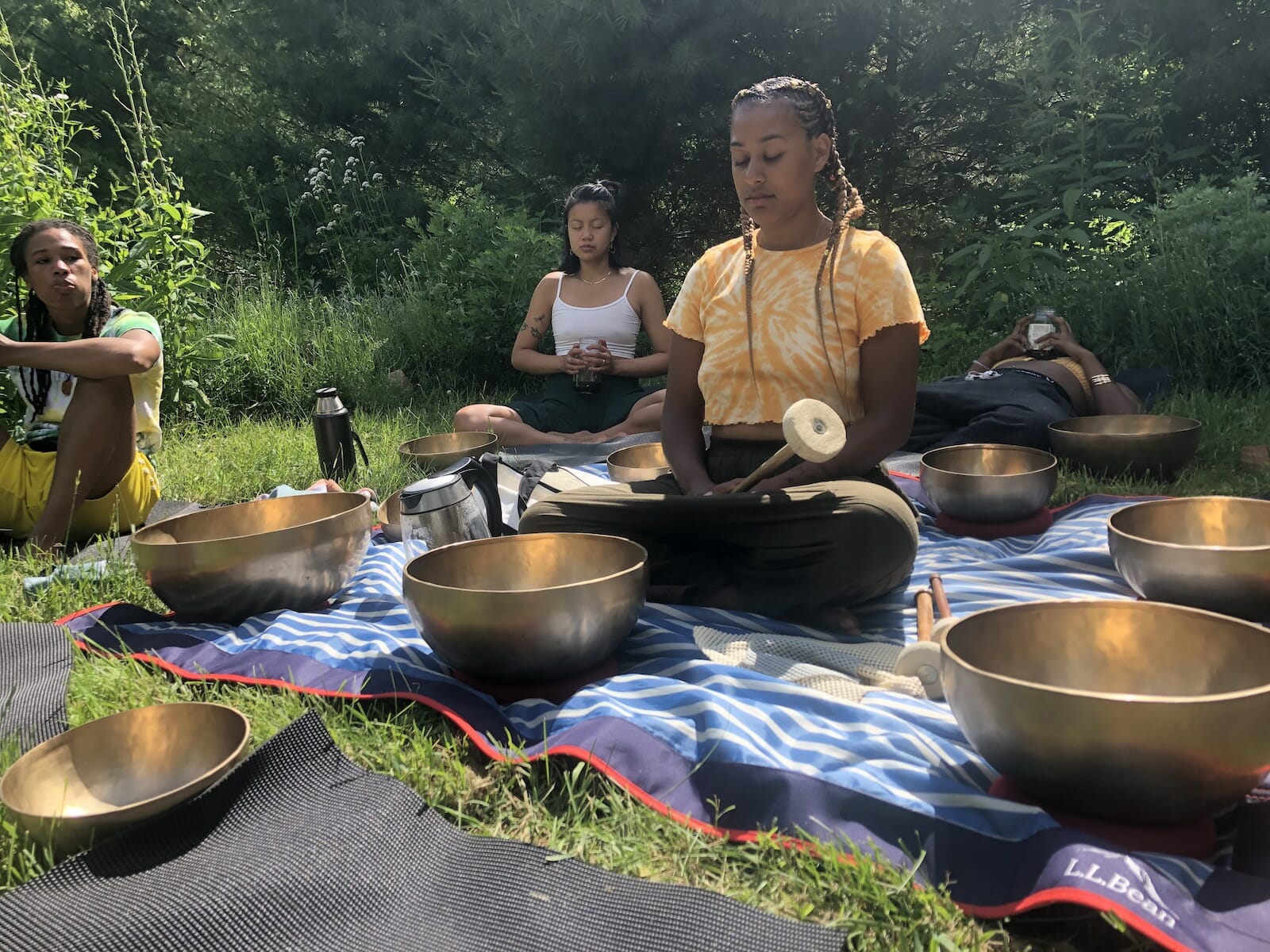
SM: I really love your point about not having to advertise, market, or trick people into consuming a product; instead, it’s about creating a community that naturally brings people in because they want to be there. To wrap up, can you share how people can get involved with the organization or donate their time and resources to facilitate SUSU’s mission?
SM: We have a GoFundMe page and a space on our website where people can donate. We definitely invite people to volunteer for the CSA project, helping to grow and harvest food and deliver boxes of food. Donations of anything are helpful. Financial donations are helpful. People who can organize folks they know who have access to resources to do giving campaigns are helpful. People who have access to things that they want to get rid of, like a farm truck, trailer, or different farm equipment that they are willing to donate are always helpful as well. As our name suggests, SUSU commUNITY Farm is all about unity, and our robust group of volunteers are essential to us furthering our mission of offering life affirming spaces for Black, Indigenous, and people of color to thrive.
To learn more about SUSU commUNITY Farm and how to get involved with the organization, please visit their website.
